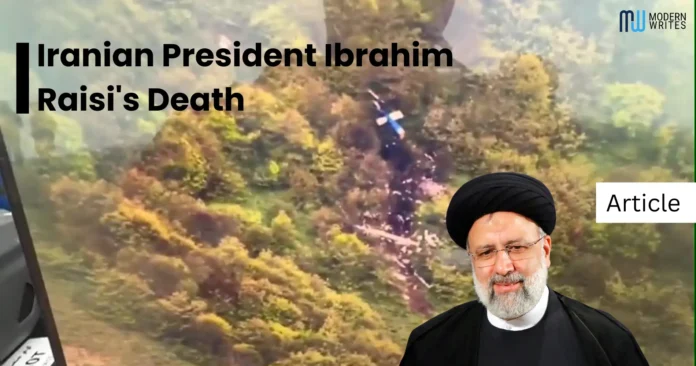The sudden demise of a leader will unquestionably have a significant effect on any nation, but the unfortunate incident that resulted in the death of President Ebrahim Raisi is happening at a highly sensitive moment for Iran and the whole Middle East area. The Islamic Republic is a significant power in the area that cannot tolerate instability in its leadership. Iranian President Ibrahim Raisi’s Death
There is now a covert war between the Islamic Republic of Iran and Syria that might turn into a regional confrontation. Within the walls of their own houses, the nation is presently going through a lengthy economic crisis and social turmoil, characterized by severe measures taken to put an end to protests. These developments are escalating the rift between the younger generation, which is more progressive, and the more conservative religious leaders. Iranian President Ibrahim Raisi’s Death
Many saw Raisi, 63, as a pliant figurehead, chosen for his loyalty to Ayatollah Ali Khamenei, Iran’s ageing supreme leader. Former Western officials and experts said it was unlikely the death of Raisi would trigger major changes in how the theocratic government handled international or domestic issues, including Tehran’s long-established hostility to the U.S. and its support of Hamas and other proxy groups across the Middle East.
His death is not likely to precipitate meaningful changes in Iranian policies. What may have changed is the considerable appetite for risk that Tehran has demonstrated over the past several years. From blindly enforcing religious strictures on their rebellious constituents to nearly going to war with Israel, the regime seems to disregard its own practical interests. Iran’s senior leadership will necessarily find itself more consumed by the task of ensuring a smooth transition to a new president amidst voter apathy and a recent history of internal unrest. Iranian President Ibrahim Raisi’s Death
However, Khamenei and the security services will be acutely aware of the risk inherent in any perception of vulnerability, both in terms of their external posture and internal politics. As a result, we should expect a skittish, reactive Iran, which may be more dangerous if it perceives itself as defensive. Iranian President Ibrahim Raisi’s Death
“I don’t expect any major fundamental shifts in domestic or foreign policy,” said Alex Vatanka, a senior fellow and founding director of the Iran program at the Middle East Institute think tank in Washington. Raisi has “always been a yes man.” While this may not change any immediate policies—foreign or domestic—many observers believed him to be a front-runner to replace Khamenei, 85, and his sudden death could upend the battle to helm the theocratic regime. Iranian President Ibrahim Raisi’s Death
Tehran has accelerated its nuclear program since the United States withdrew from a landmark agreement capping its activities and has now pushed far beyond the restrictions imposed in that deal, enriching uranium close to the levels needed to build nuclear weapons, according to the International Atomic Energy Agency. Meanwhile, it is supporting a number of proxy forces fighting Israel and, in some cases, American forces across the region, from Hamas in Gaza and Hezbollah in Lebanon to the Houthis in Yemen and fighters in Iraq and Syria. Iranian President Ibrahim Raisi’s Death
The situation escalated last month after a suspected Israeli bombing of a consular building in Damascus, Syria, killed two Iranian generals. Iran’s unprecedented direct response of 300 missiles and drones fired at Israel brought the rivals closer to a wider war that neither appeared to want. Iranian President Ibrahim Raisi’s Death
He stated that Iran’s sudden succession dilemma could potentially weaken its control over these militias. “And they may actually begin anew with their attacks on U.S. troops and bases.” It’s clear that Iran wants to convey an air of stability and strength.
Khamenei enacted Article 131 of the Constitution, giving Vice President Mohammad Mokhber power and mandating elections within 50 days, while also launching five days of mourning featuring public funeral processions in major cities that began Tuesday.
The ascension of Raisi to the regime’s second highest office was not a function of any discernible charisma or political skill but rather an acknowledgment that he possessed the qualities most valuable for late-stage autocracy—mmindless loyalty to the ruling system, a track record of unhesitating brutality, and deep integration within the religious, familial, and security networks that underpin the state. In this sense, he was a reliable functionary of the clerical state, a symptom, not the cause of its domestic repression and regional aggression. Iranian President Ibrahim Raisi’s Death
As with many ageing leaders, Khamenei is facing his own generational dilemmas. He has been aggressive in purging his peers and old establishment figures, such as former president Hassan Rouhani and former parliament speaker Ali Larijani. These men were at times prone to questioning his judgement and even challenging his decrees. They were, after all, responsible for transacting an arms control agreement with the perfidious Americans that yielded little in terms of economic dividends. Subsequently, the team of former President Donald Trump unilaterally revoked the accord and reinstated all sanctions. And with that, Washington helped to collapse the Iranian political center.
Despite the dramatic development of the deaths of two senior Iranian officials at a time when multiple conflicts are raging in the region, it is unlikely to significantly alter the course of those fights, as decisions over foreign policy and war remain under the purview of Supreme Leader Ali Khamenei. The president of the Islamic Republic is an implementer, not a decision-maker, so the policies and fundamentals of those policies will remain the same.





